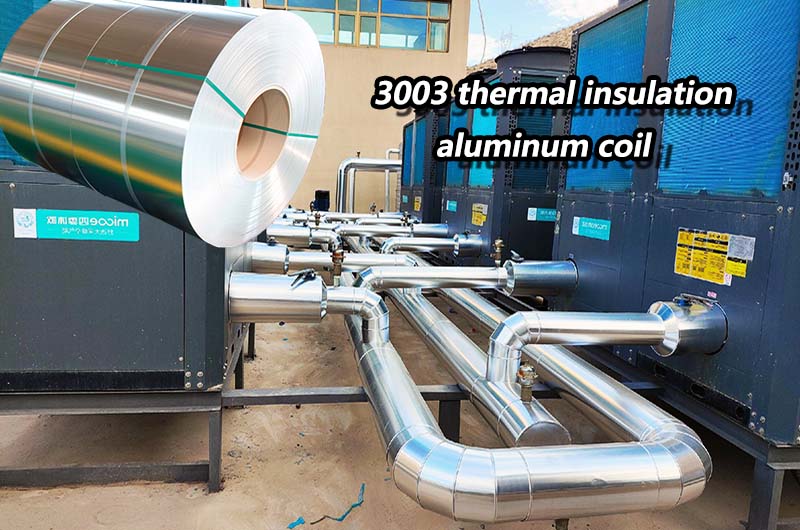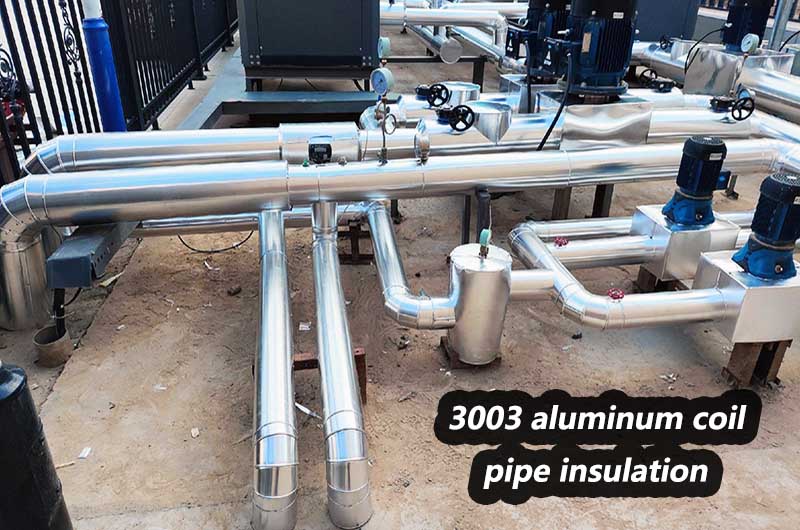The construction industry has more and more requirements for materials. In the context of the new era, the performance requirements of building materials must not only be beautiful and durable, but also have certain thermal insulation properties.
In recent years, the use of thermal insulation aluminum sheets has become more and more widespread. Aluminum alloy materials can be used for various pipeline insulation, equipment insulation, tank insulation, reactor tank insulation, etc. The models include 1060 insulation aluminum coil and 3003 insulation aluminum coil. The thickness ranges from 0.5-3.0mm. Compared with iron sheet, aluminum sheet has excellent anti-rust function.

3003 aluminum coil is an alloy product with added manganese alloy element. Compared with 1060 aluminum coil, it has better anti-corrosion performance. In coastal or highly corrosive environments, it is recommended to use 3003 aluminum coil.
Principle: Add another layer of aluminum skin to the outside of the insulation material to reduce heat loss and bring better insulation effect.
For equipment insulation, the aluminum skin insulation system can reduce the impact of the external low-temperature environment on the equipment, reduce energy consumption and loss to a large extent, and thus bring higher economic benefits.
3003 thermal insulation aluminum coil is a representative product of the 3 series aluminum-manganese alloy. It is also called anti-rust aluminum coil. Its strength is about 10% higher than 1100. 3003 thermal insulation aluminum coil is mainly used in pipes, building roofs and walls as insulation materials, etc. field.
Advantages of 3003 thermal insulation aluminum coil
- 1. The strength is higher than that of 1 series pure aluminum, with good processability and formability, meeting various processing requirements.
- 2. It has strong corrosion resistance, is suitable for special environments, and can maintain a long service life.
- 3. 3003 thermal insulation aluminum coil has fire and heat insulation functions, and its fire resistance is also very good.
3003 thermal insulation aluminum coil specifications
- Thickness: 0.2mm-8mm
- Width: 100-2650
- Length: 500-16000
- Material status: h14
Generally, 0.5mm thick 3003 aluminum coils are used for thermal insulation aluminum coils.

3003 thermal insulation aluminum coil applications
3003 aluminum coils are usually used in building materials, pipe insulation and other fields.
- 3003 Pipe Insulation Aluminum Coil: 3003 Insulation Aluminum Coil may be used as the insulation layer of pipes to prevent heat loss and improve transportation efficiency.
- 3003 thermal insulation aluminum coil for building insulation materials: 3003 thermal insulation aluminum coil may be used as thermal insulation material in buildings to help maintain the temperature inside the building and improve energy efficiency.
- Refrigeration equipment: In the manufacturing of refrigeration equipment, 3003 aluminum coils are often used to make radiators and insulation layers, which help maintain a stable temperature inside the equipment.
- Automobile manufacturing: Aluminum coils are widely used in automobile manufacturing. 3003 thermal insulation aluminum coils may be used as the heat insulation layer of vehicles to improve the energy efficiency of vehicles.
How to avoid corrosion of aluminum insulation coils?
Corrosive oxidation means that before the aluminum coil is used, due to the packaged state, the surface of the aluminum coil is not completely in contact with the air and has not yet formed a protective layer. In this case, if the aluminum coil is exposed to water, rain or moisture Afterwards, the moisture in the moisture will react chemically with the surface of the aluminum coil, causing corrosion of the aluminum coil. The corroded aluminum coil will show signs of corrosion. However, after this kind of corrosion occurs, there will be no secondary damage to the aluminum coil. There is no problem with the aluminum coil itself, but the appearance is damaged.
- (1) Where there is leakage of rain or snow on the roof of workshops or warehouses, aluminum coils should not be placed.
- (2) Strengthen the management of air drying to ensure that there is no water in the compressed air.
- (3) The packaging of aluminum foil rolls should be sealed and an appropriate amount of desiccant should be placed in each roll.
- (4) When transporting from a low-temperature area to an area with high temperature and humidity, do not open the sealed package immediately.
- (5) Strengthen the management of rolling oil and control its moisture content below 0.04%.
- (6) The humidity of the wooden shaft and board of the packaging box shall not be greater than 18%, and the temperature of the packed colored aluminum coils shall not be greater than 45°C.
Normal oxidation means that after the aluminum coil is used, such as after being wrapped on a pipe, the surface of the aluminum coil will be completely in contact with the air, forming an oxide film. This oxide film will protect the aluminum coil from further corrosion, so after use , even if it is exposed to rain or outdoor exposure, the thermal insulation aluminum coil will not corrode.

